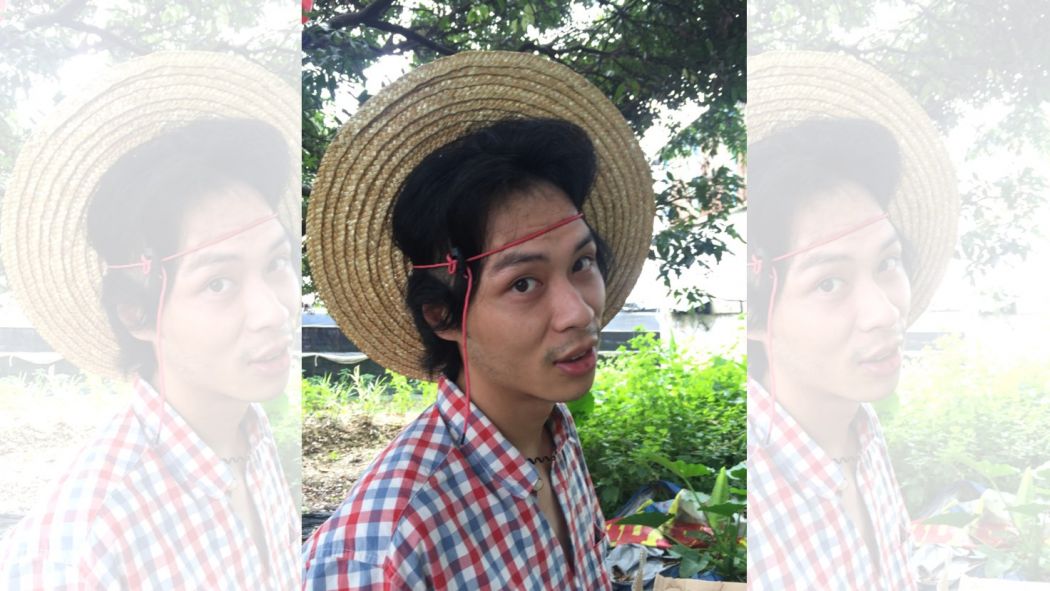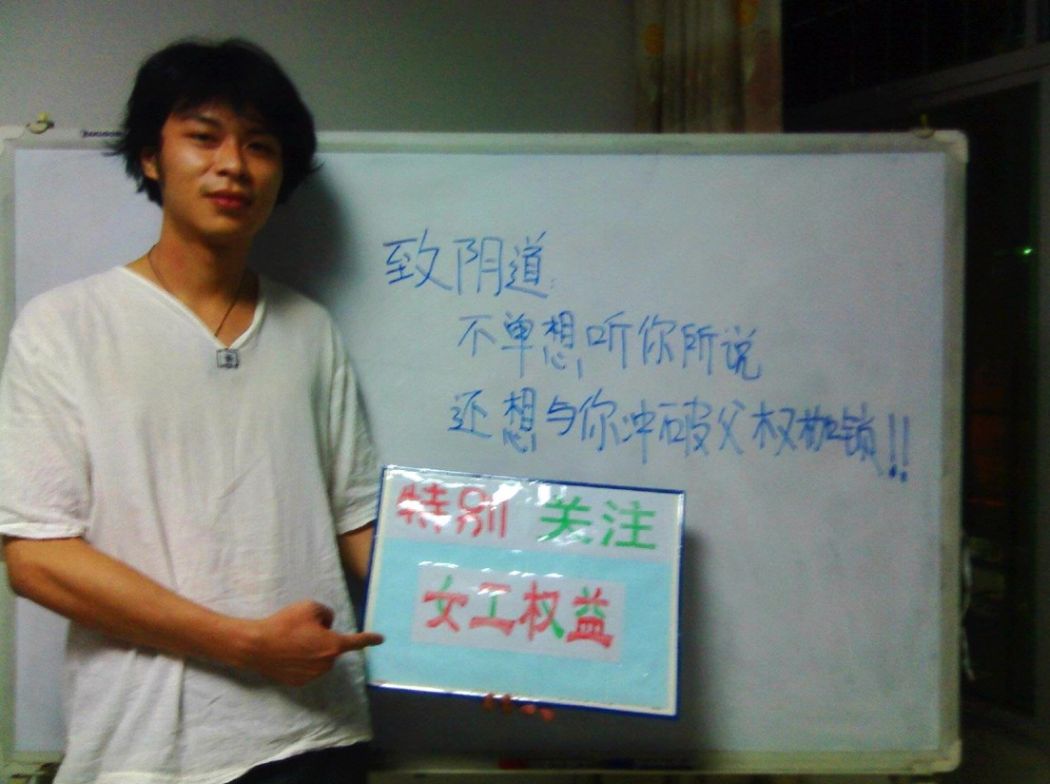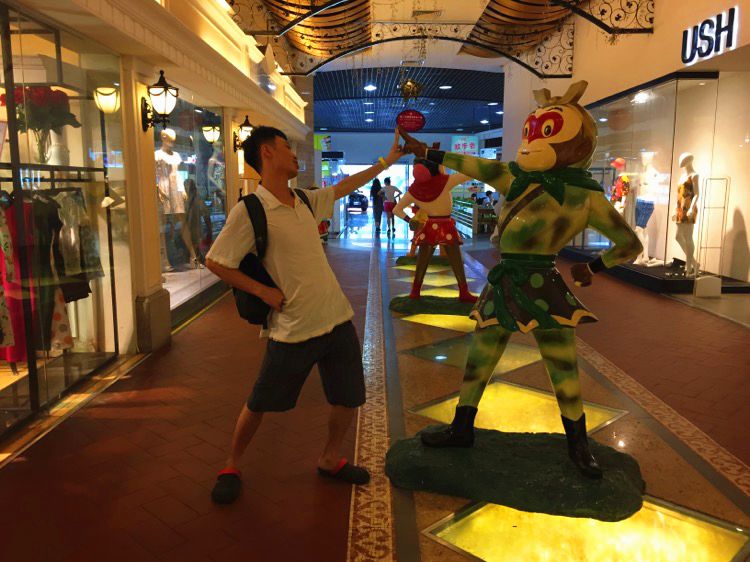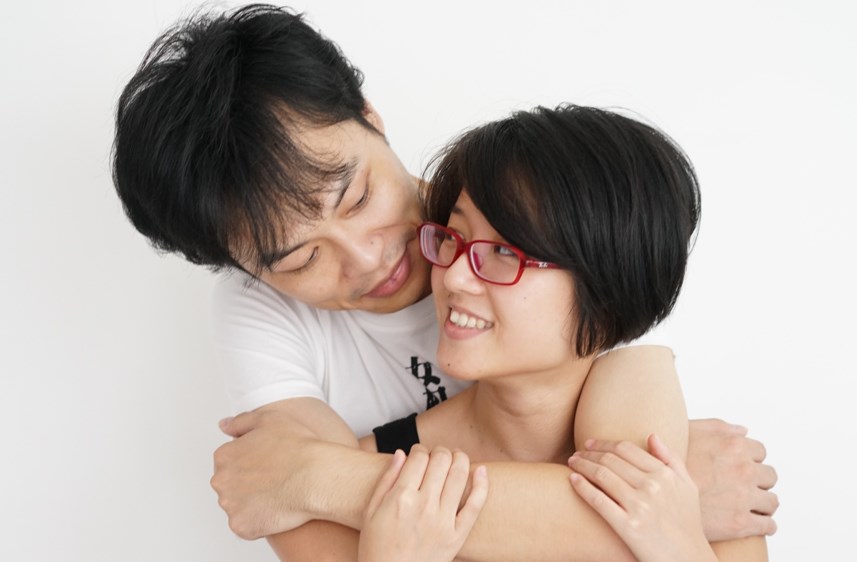On 20 March 2019, Wei Zhili, a labour activist and editor of the pro-labour social media group “New Generation” (新生代), was arrested at his home in Guangzhou. Two of his coworkers, Yang Zhengjun and Ke Chengbing, have also gone missing. In the preceding months, Wei—or, as friends call him, “Xiaowei”—had been assisting workers with pneumoconiosis with legal claims.
In a desperate attempt to claim compensation, these workers organised a protest in Shenzhen in November 2018 and were suppressed by police. Wei is among the latest activists who have been swept up in the ever-widening net of repression in the aftermath of the Jasic labour struggle. The author of this piece, Zheng Churan, more widely known as “Datu” (大兔), is Wei’s wife and a long-term feminist activist.
In 2015, she herself was arrested along with four other activists, collectively known as the “Feminist Five” for attempting to organise a campaign against sexual harassment on public transportation. In this beautifully written and moving piece, written days after Wei’s arrest, Datu recounts how Xiaowei became a labour activist and their love story. In her words: “Perhaps this will be censored or deleted. But I will make my utmost effort to let the world know Wei Zhili’s story, to not let the world forget him. This is Datu and Xiaowei’s love story.”
By Zheng Churan
Wei Zhili pursued me for a very long time. But after he finally succeeded, one time he happened to get very angry with me.
On one summer night—I was still a young punk then—we were strolling in an industrial park, holding hands and smoking. Without much thought, I finished the cigarette and threw it onto the ground.
The smile immediately disappeared on his face. He was shocked, and his eyes widened: “How could you possibly do this? The sanitation workers are exhausted every day.”
Although he didn’t say it very loudly, I could tell he was extremely annoyed at me. Before I got a chance to react, he had already bent over to pick up the cigarette butt soaked in sewage, crossed the street and threw it into the garbage bin.
I was so ashamed at that moment that I wanted to chop my hand off, especially because he once called me a “Goddess” (女神). Since then, I’ve never littered anytime or anywhere and I have stopped many others from littering as well.
That was 2013. We have been together for six years.
A very special love story
This is a very special love story. It involves the growing together of a very critical feminist and a gentle labour activist who never quarrelled with anyone. It also involves two criminal detentions, many painful farewells, nonsensical humour, and the great friendship and wisdom of many activists.

‘I would often try to dress him up nice, but he would just refuse. He said he doesn’t like to dress up in fancy clothes.’ Photo: FreeWeiZhili.
It was 2013 when I first met Zhili. At that time, he was working for the Hand-in-Hand Workers Centre (手牵手工友活动中心) in Shenzhen. He was wearing a discoloured t-shirt with a hole in it, and a pair of slippers. He had long curly hair casually pulled back by a headband sitting on top of his head. Wei is 5 feet 11 inches tall and has long limbs. His face resembles a dragon because he has a high forehead and big eyes. He was not really slovenly dressed, but I felt it was a waste that he dressed like that given how good-looking he was.
Six years later, because he assisted workers affected by pneumoconiosis in claiming compensation, he was detained by the Shenzhen police. When workers talked about him on their social media, they would always say: “His clothes were quite shabby. We wanted to send him money to buy new clothes whenever we saw him.”
In fact, Wei Zhili’s family is not that poor: they can afford to buy decent clothes. His mother has been doing administrative work at a port for 30 years. His father has had a bumpy career, working as a worker, a taxi driver, and a nurse at a psychiatric hospital. Obviously, the family is not wealthy, but Zhili doesn’t really fancy a rich lifestyle. He has always lived a frugal life and hardly ever spends money on new things.
However, his parents always tried their best to provide him quality education and proper guidance. For instance, they were never stingy when it came to buying him books, asking him to explore life’s meaning in literature. Therefore, when other kids were happily purchasing tokens for game machines, he was reading masterpieces such as Stendhal’s The Red and the Black and Victor Hugo’s Les Miserables. He came across Das Kapital by accident during middle school and found it very interesting, but the book was too expensive, so his mother bought him a simplified version. After he finished reading it, he went and found the full version—which was as thick as a brick—in the school library and read it from cover to cover. He read whatever he could get his hands on. And the books taught him about exploitation, social structure, freedom, democracy, and how to care about the underclass.
Zhili’s grandfather was a worker at a port before 1949. He later became a ship loader and was awarded the title of “model worker” (劳动模范) by the government. The workload at the port was heavy, but the workers were like brothers and helped each other out.
Zhili grew up at the port, and saw elderly workers become ill because of the physically-demanding work. When they had a herniated disc, it would hurt them so much that they just lay there expressionless. But at the same time, Zhili also saw how they were genuine to each other. At work, they were like a family supporting each other through the heavy workload, helping move goods, and sharing food. Although Zhili had not done any demanding work himself, the situation of workers was deeply rooted in his heart.
Since I was young, I have not been through many hardships as my family was relatively affluent. Before I knew Zhili, I hardly came across the problems of the workers. However, he would speak to me every day about the living conditions of the different workers we came across, and he made me think about why sanitation and construction workers had to work so hard, but were still very poor. They are not lazy or stupid, it is that society has structural problems that allow the rich to become richer while the poor become poorer.
In today’s China, young workers perhaps have more opportunities to make a living, but the older ones can only work in the dirtiest and most tiring jobs. Although we would praise sanitation workers as the “beauticians” of the city, they live a precarious existence in informal villages within the city. If they strain a muscle in their back, they don’t have any medical insurance and can only purchase some ointment to help with the pain. The next day, they still get up at 4am to go out and sweep the streets.
Zhili forced me to think about all these issues that I rarely considered. If he wasn’t my boyfriend, I probably would have kicked him in the face to make him stop talking. But he was so persistent! Every day, he would talk to me about three cases, and with my patience growing like a piece of chewing gum that has been stretched two meters in length, I eventually became a feminist who also focused on workers’ rights. I suppose he used this kind of persistence to educate other workers.
A pure-hearted boy
Just as many people come and ask me how I became a feminist, I would also ask Zhili how he became interested in worker rights. His story is very simple and, you could say, quite logical.
That year, he was 20.
People like Zhili who sympathise with the vulnerable have a habit of donating blood regularly. One day, while standing in line at the school’s blood donation station one day, he happened to skim through a booklet left on the bulletin board.
The booklet was aimed at promoting occupational health and safety, and that specific issue happened to be about the tragic lives of workers affected by pneumoconiosis.

Photo: FreeWeiZhili.
The soil of Shenzhen, Guangdong, is mainly composed by lightly weathered granite with a hard texture. Once it is drilled into, the granite beneath the ground’s surface breaks down into a fine dust that is deposited in the lungs of workers digging in caves. Inhaling a large amount of dust, workers’ lungs thus become black, and they begin experiencing extreme chest pain each time they breathe. Pneumoconiosis is a terminal illness. Victims can only wait for their death, coughing up black phlegm and becoming weaker by the day as they look after their children and elderly parents at home.
“It frightened me, seeing those lungs looking like blackened honeycombs. The photo of an old man holding a crying child in his arms made me feel like I had pneumoconiosis myself, and for a few seconds, I couldn’t even breathe.” As Zhili recalled that moment, he clutched his chest with his hand.
That time he saw the booklet about workers with pneumoconiosis was like a kick in his guts. He started going out more instead of staying in the library all day. He enrolled in the journalism major at Guangzhou University for four years, but skipped countless classes. His college roommate recalled: “Everyone was skipping classes to play video games in the dorm at the time, but Zhili would always skip class to go to Sun Yat-sen University for lectures, which was bizarre to us.”
At Sun Yat-sen, he made friends with some teachers and students in the Sociology Department. During his senior year, he joined the research team of the well-known sociologist Pun Ngai to conduct research on the living conditions of workers who suffered from pneumoconiosis in several provinces. Pun Ngai is his idol. The fact that young scholars internalised a deep concern for the underclass while doing research inside factories aligned with Wei’s eagerness to change the world around him. I don’t know what he witnessed during those field trips, but I do know that he made his career decision of assisting workers after he returned. He has never looked back.
We’ve been together for six years. I am confident to say that I know him well. At least well enough to tell you that he would sacrifice anything to help others fight for their rights.
He is a soft person but he is very persistent and sometimes can be even a little bit stubborn and single minded. He can play a football video game for five years just because he loves it; he can read through Crime and Punishment from cover to cover over ten times because it’s one of his favourites books. He loves playing street basketball and he told me back in middle school that he would go to the court between classes just to practice those graceful moves. He would practice in front of the mirror as well, and even move his arms in the air to practice dribbling without the ball. His best friend told me that Zhili always bragged about how he’d wear out a pair of shoes every month because of the effort he put into practising basketball.
It’s the same stubborn guy who once he had decided that helping out vulnerable workers fight for their rights was the meaning of his life never backed down. I am the same. I am also an activist myself and I’ve never experienced any form of gender discrimination, but I will always fight for equality and justice. I just cannot stand seeing others being treated unfairly.

Photo: FreeWeiZhili.
People sometimes use the term “knight-errants” (一身侠气) to describe us. It’s not an exaggeration at all. Both of us grew up in middle class families in the 1990s with a culture of “heroes and warriors” (仙侠文化). Since our youth, we were influenced by education and mainstream media: “At the sight of injustice, draw a sword and render help.” In other words, we had to help others who are treated unfairly, and speak up for them or else we wouldn’t be able to become our ideal selves.
The way we think about the meaning of life is very different from many of our peers. I think the meaning of life is not limited to the happiness of oneself, or the well being of one’s family. It is more about using one’s limited ability and power to change the world, especially to address injustice and inequality and to ensure that each person lives free from oppression.
In fact, with my limited power, I have been able to change the fate of some individuals. In 2012, we used performance art to call on the Supreme Court to waive the death penalty of a domestic violence survivor. We wrapped our bodies with white gauze as a metaphor for women who had suffered domestic violence and abuse, and went to the entrance of eight city courts to silently protest. The story was picked up and widely reported by the media and eventually the Supreme Court appealed the decision.
Zhili and I have always been encouraging each other along the way. The little changes and differences we were able to make each day helped to numb the fear of the consequences related to our work. Our love for each other goes beyond passionate sex, casual activities, and everyday life. This little bit of social responsibility has ensured that our hands have remained tightly held.
Detained for assisting workers with pneumoconiosis
Zhili joined the Hand-in-Hand Workers Centre right after his graduation. After the Centre was forced to shut down, he started doing something related to his college major: he became an editor for New Generation, a social media platform that provides information for workers.
His writing style is unique. He likes using screenshots from Hong Kong movies when describing workers’ lives. They often use Marxism as a framework to analyse labour relations, so their pen names are all preceded by the surname “Ma” (马, the first character in Marx’s name in Chinese, 马克思). His favourite pen name is “Ma Xiaoling” (马小玲), which actually comes from the name of the protagonist of a Hong Kong TV drama “My Date with a Vampire”—he isn’t a Marxist who shouts slogans and waves flags, as many would imagine Marxists to be. Rather, he is an interesting advocate who writes articles in a way that workers love to read.
I haven’t read many of their articles but I’m a fan of his “Women’s Weekly” (妇女周报) column, in which they often discuss issues regarding female workers: menstrual leave, sexual harassment in the workplace, maternity leave, domestic violence, familial burdens, etc. I know that workers like to read his articles and discuss them with him.
Sometimes he went out and met up with workers who had become his friends. Quite often, some older ladies told him that he looked very skinny, and loved giving him fruit and snacks. They asked him to bring the food back and share it with his family. Once, when I was suffering from serious diarrhoea, he went out to see an older lady who was working at a store. The lady gave him medicine, carefully explaining to him how I should be taking it.
If he didn’t treat others with such care, I’m sure he wouldn’t have so many friends concerned about his daily life and his family’s health.
In November 2018, some workers from Hunan affected by pneumoconiosis went to Shenzhen to defend their rights. This issue always touches the deepest part of his heart. He knew clearly that it would be risky to help them considering that the police had treated them with violence and many labour activists were being detained one by one, but he couldn’t merely stand by watching their struggle without doing anything.
He told me: “I have to help them no matter what.”
Almost everyone from that village in Hunan had come to Shenzhen to work as a driller. The labour protection equipment was terrible. Some workers washed their masks every day after work and wore the same mask to work underground the next day. That’s how their lungs were destroyed by the dust. At first, they were unaware of this and the hospitals treated them as tuberculosis patients. Later, most of the workers were diagnosed with this ‘unknown’ disease.
They built skyscrapers for Shenzhen but lost their health. They asked for compensation, but some doctors refused to provide them with the proof of their diagnosis and their employers refused to verify their employment relationship. So they kept coughing up black phlegm while standing in the concrete jungle they built, asking for compensation.

Photo: FreeWeiZhili.
Zhili seldom cries. But he cried when he talked about the life of a worker’s family. The worker passed away because of pneumoconiosis. In the time leading up to his death, he was in so much pain that he stopped breathing. His older and younger brothers also passed away because of the same disease. Now only his mother is left, and she is in her eighties with her youngest son who also has pneumoconiosis. His health is getting worse by the day. The old mother looks at him helplessly: lung cleansing only works for some people and the only surviving brother cannot ease his pain in this way.
He didn’t cry when he was making arrangements for his grandpa’s memorial service; he didn’t cry when I was detained because of the anti-sexual harassment protest; he didn’t cry when he broke his arm during a basketball game. That was the only time that he cried.
He knows of course that merely crying and sympathising is useless, so he constantly publishes and updates news on workers’ rights protection on New Generation. He posted the same articles over and over again when they were deleted by the authorities, treating every word as if it were extracted from the blood of the workers.
In January this year, his colleague Yang Zhengjun (also known as “Baozi”) was detained by the police for helping workers with pneumoconiosis. I was very worried. There were a few times when I wanted to open my mouth to tell Zhili to give up and stop publishing articles, but in the end I couldn’t say those words because the workers were in so much misery. Reports from the scene of the workers’ protest show that not only were workers brutalised by the police, but their families and even pregnant women were pushed and shoved. The old, weak, sick, and pregnant: what a desolate scene!
How could I tell my husband to stop helping them? But I was afraid. I was afraid that he would also be detained for doing things that the government does not like. Life in the detention centre is hard and I did not want my loved one to experience the difficulties that I have been through.
Actually, he was afraid too. I think no one can avoid the fear of leaving family behind, losing freedom, and being imprisoned. We turned to words that we had always used to encourage one another: “My feet are trembling with fear, but how can I not do it?”

Photo: FreeWeiZili.
In the early hours of 20 March, Zhili was taken away from his home in Guangzhou by the police. After he disappeared for five days, neither his parents nor I had any news about him, nor had we received any official notification about his detention. I visited three public security bureaus and two local police stations, crying the entire time. I petitioned. I called 12389, which is the police reporting line; I called 110, which is the general police line, to report his disappearance; I called 12345, which is the public administration service line, to complain. My Weibo post was forwarded more than 6,000 times. I comforted his and my own parents. I coughed up blood. I could not fall asleep. I was hungry but had no appetite, while also experiencing diarrhoea. I would wake up after only ten minutes of sleep and check my phone to see if there was any news about him. When your beloved one has disappeared and the people in power refuse to tell you where he is, how is it any different from tearing out the middle of a love story?
Perhaps, the attention of the people online and my complaints worked. On 26 March, as I was on my way to ask every detention centre in Shenzhen about my husband, the police called me to inform that Zhili was detained by the Shenzhen Pingshan Public Security Office at the No. 2 Detention Centre for ‘picking quarrels and provoking trouble’.
The police said that they had sent the notice of detention, but had no idea why I did not receive it.
I have never been this happy for receiving a detention notice call. At least I know that he has been formally arrested, not simply disappeared and abused. I immediately hired a lawyer who applied for an appointment. The police told the lawyer that this is a sensitive case so the meeting could only take place 48 hours after the appointment.
I felt restless again since I knew that Yang Zhengjun was never allowed to meet with his lawyer. Fortunately, on 28 March the lawyer told me: ‘We are lucky. I almost couldn’t see Wei Zhili, but in the end we could meet.’
It turns out that the bureau in charge of the case has various ways to prevent lawyers from meeting their clients, such as setting an arraignment at the time of the meeting or simply not allowing the client to schedule an appointment, so our lawyer smiled. He said that Zhili had shaved off his curly hair and changed his clothes to the grey detention centre uniform, but he is in good condition. He confirmed that the three editors of New Generation—Yang Zhengjun, Wei Zhili, and Ke Chengbing—are all being detained in the same detention centre for helping the pneumoconiosis workers.
Zhili told the lawyer that he was not tortured to make forced confession, but the police kept scolding him, saying that he was not filial to his parents and was manipulated by workers. I remembered that on the day Zhili was taken away, the police said to Wei’s mother: ‘Your son graduated from a good university, but did not buy a house, does not have children, does not have a proper job. We need to take him away to reeducate him.’
‘We should help the weak. In the face of injustice, we should stand up and resist.’ We were educated with these words when we were children. This sort of behaviour has always been praised by the mainstream society. However, when we grew up and began help others, they became afraid. They undermine us by saying that we are being manipulated, and they think that working in an NGO is not a real job.
Some of the workers affected by pneumoconiosis that they had been helping cried when they learned about the arrests. They immediately tried to go to Shenzhen to demand an explanation, but they were intercepted by the police and could not go reach their destination.
The three arrested men may be viewed as not having a proper job in the eyes of mainstream society, but they are the most kind-hearted people in the eyes of workers. In a society where it is a ‘crime’ not to buy a house or have children, it is ironic that helping others can lead to accusations of picking quarrels and provoking trouble.
They laugh at our kindness and naiveté. They laugh at the fact that we cannot tolerate seeing others suffer. They laugh because we hope to solve a problem, but in the end we ourselves have become a problem in need of a solution.
Reposted from Hong Kong Free Press: https://www.hongkongfp.com/2019/04/21/separated-high-wall-love-story-chinese-feminist-zheng-churan-detained-labour-rights-activist-wei-zili/

 Detained Feminists’ Loved Ones Plead for No Charges in China
Detained Feminists’ Loved Ones Plead for No Charges in China